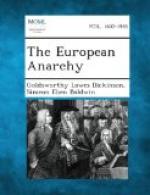And, so far as Great Britain was concerned, the relations she entered into with France and with Russia were directed in each case to the settlement of long outstanding differences without special reference to the German Powers. But it is impossible in the European anarchy that any arrangements should be made between any States which do not arouse suspicion in others. And the drawing together of the Powers of the Entente did in fact appear to Germany as a menace. She believed that she was being threatened by an aggressive combination, just as, on the other hand, she herself seemed to the Powers of the Entente a danger to be guarded against. This apprehension on the part of Germany, is sometimes thought to have been mere pretence, but there is every reason to suppose it to have been genuine. The policy of the Entente did in fact, on a number of occasions, come into collision with that of Germany. The arming and counter-arming was continuous. And the very fact that from the side of the Entente it seemed that Germany was always the aggressor, should suggest to us that from the other side the opposite impression would prevail. That, in fact, it did prevail is clear not only from the constant assertions of German statesmen and of the German Press, but from contemporary observations made by the representatives of a State not itself involved in either of the opposing combinations. The dispatches of the Belgian ambassadors at Berlin, Paris, and London during the years 1905 to 1914[2] show a constant impression that the Entente was a hostile combination directed against Germany and engineered, in the earlier years, for that purpose by King Edward VII. This impression of the Belgian representatives is no proof, it is true, of the real intentions of the Entente, but it is proof of how they did in fact appear to outsiders. And it is irrelevant, whether or no it be true, to urge that the Belgians were indoctrinated with the German view; since precisely the fact that they could be so indoctrinated would show that the view was on the face of it plausible. We see, then, in these dispatches the way in which the policy of the Entente could appear to observers outside it. I give illustrations from Berlin, Paris, and London.
On May 30, 1908, Baron Greindl, Belgian Ambassador at Berlin, writes as follows:—
Call it an alliance, entente, or what you will, the grouping of the Powers arranged by the personal intervention of the King of England exists, and if it is not a direct and immediate threat of war against Germany (it would be too much to say that it was that), it constitutes none the less a diminution of her security. The necessary pacifist declarations, which, no doubt, will be repeated at Reval, signify very little, emanating as they do from three Powers which, like Russia and England, have just carried through successfully, without any motive except the desire for aggrandizement, and without even a plausible pretext, wars of conquest in Manchuria and the Transvaal, or which, like France, is proceeding at this moment to the conquest of Morocco, in contempt of solemn promises, and without any title except the cession of British rights, which never existed.
On May 24, 1907, the Comte de Lalaing, Belgian Ambassador at London, writes:—




